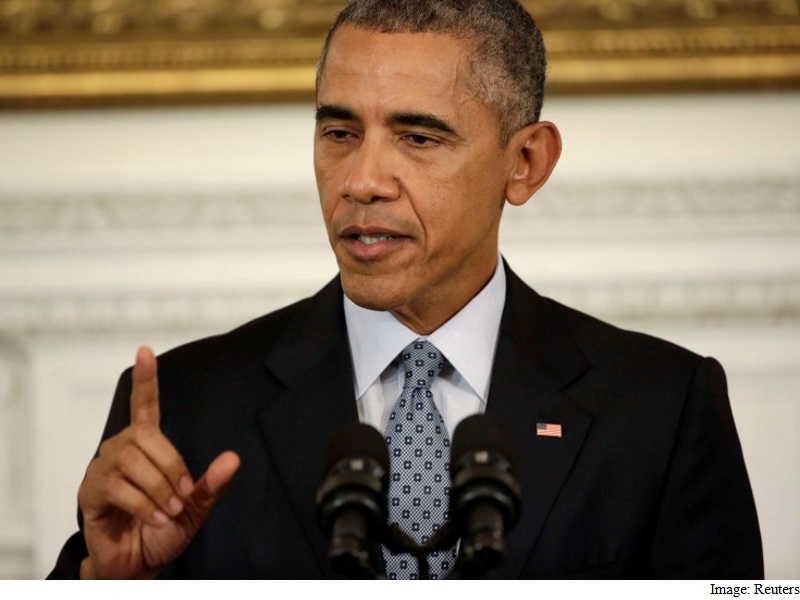- Home
- Others
- Others News
- US President Obama Puts His Finger on the Real Danger of Robots
US President Obama Puts His Finger on the Real Danger of Robots

"Frankly when you look at job loss and lost leverage, automation and technology has probably contributed more than trade has to that problem," Obama said.
The role of technology in job creation and destruction has been debated up, down and sideways for years, but it's a big deal that the commander-in-chief calls it out as a problem. And it's exactly that narrative that the robotics lobby is trying to combat, with a white paper it put out on Monday making the case that high tech is good for American workers, not bad for them.
"We've been talking about this issue for several years, without much attention, because all the attention goes to people writing studies about how robots are job killers," said Jeff Burnstein, president of the Association for Advancing Automation.
There are in fact lots of studies on both sides of the issue, and it's difficult to draw definitive conclusions, in part because of the lack of clear data that adequately measure the changing nature of metrics like productivity and work. But Burnstein says all you need to do is look at two numbers: Job growth and robot growth.
Since 1996, non-farm employment has in fact climbed almost on pace with shipments of industrial robots.
"It clearly doesn't mean that jobs are being destroyed by robots if, at record levels of robot sales, unemployment is falling," Burnstein says. Of course, correlation doesn't mean causation - why is Burnstein confident that those two trends are related?
"I think the key to it is, whatever is making robot sales rise is what's making unemployment fall," he says. "What's happening is, companies who feel that they're in a stronger position are implementing automation and hiring people at the same time."
That's true for some companies. And sure, a certain amount of manufacturing that might have otherwise gone overseas entirely only exists in the United States today because robots have reduced the necessary manpower enough that budgets pencil out.
But in the data that Burnstein uses in his white paper, the numbers representing robot shipments are rising faster than the one that shows overall jobs numbers. And labour force participation, which measures the proportion of the population that's either working or looking for a job, continues to drop. So it's still possible that automation is taking the edge off what might otherwise be faster growth - it's hard to tell.
And actually, the impact of technology on workers isn't just about the number of jobs available. It's also about the concept of "leverage" that Obama mentioned, which translates into wages. And that's the metric that hasn't recovered in the aftermath of the recession.
"So even if the jobs are being created, companies don't feel obliged to give people raises as demand for their products go up," Obama said. "They can say to themselves, 'You know what, we'll just invest in more automation instead of hiring more workers, or if we do hire more workers, we'll tell them, 'This is how much we can afford, and if you want more, then we know that there's a bunch of other people that we can get.'"
Obama went on to emphasize that we shouldn't try to stop the march either of globalization or of technology, but rather help workers to adapt and compete. And robot boosters are confident that automation will offer at least as many new opportunities as it destroys, because it always has.
"We used to have a huge percentage of people working on farms. Now we don't. We used to have a lot of elevator operators. Now we don't," Burnstein says. "We've always been able to create new jobs. Twenty years ago, was there a job called an app developer? How about a SEO specialist, or a social media director? Tell me why this is different."
It's impossible to say at this point that the next wave of automation will diverge from the pattern of history - but simply matching job growth to robot growth doesn't prove that it won't.
© 2015 The Washington Post
For the latest tech news and reviews, follow Gadgets 360 on X, Facebook, WhatsApp, Threads and Google News. For the latest videos on gadgets and tech, subscribe to our YouTube channel. If you want to know everything about top influencers, follow our in-house Who'sThat360 on Instagram and YouTube.
- Galaxy S24 Series
- MWC 2024
- Apple Vision Pro
- Oneplus 12
- iPhone 14
- Apple iPhone 15
- OnePlus Nord CE 3 Lite 5G
- iPhone 13
- Xiaomi 14 Pro
- Oppo Find N3
- Tecno Spark Go (2023)
- Realme V30
- Best Phones Under 25000
- Samsung Galaxy S24 Series
- Cryptocurrency
- iQoo 12
- Samsung Galaxy S24 Ultra
- Giottus
- Samsung Galaxy Z Flip 5
- Apple 'Scary Fast'
- Housefull 5
- GoPro Hero 12 Black Review
- Invincible Season 2
- JioGlass
- HD Ready TV
- Laptop Under 50000
- Smartwatch Under 10000
- Latest Mobile Phones
- Compare Phones
- Vivo V30e
- Itel Super Guru 4G
- Huawei Pura 70 Pro+
- Huawei Pura 70 Ultra
- Tecno Camon 30 Premier 5G
- Motorola Edge 50 Fusion
- Oppo A1i
- Oppo A1s
- Asus ZenBook Duo 2024 (UX8406)
- Dell Inspiron 14 Plus
- Realme Pad 2 Wi-Fi
- Redmi Pad Pro
- Cult Shock X
- Fire-Boltt Oracle
- Samsung Samsung Neo QLED 8K Smart TV QN800D
- Samsung Neo QLED 4K Smart TV (QN90D)
- Sony PlayStation 5 Slim Digital Edition
- Sony PlayStation 5 Slim
- Hitachi 2 Ton 5 Star Inverter Split AC (RAS.G522PCBISF)
- Haier 1.5 Ton 5 Star Triple Inverter Split AC (HSU18K-PYSS5BN-INV)












